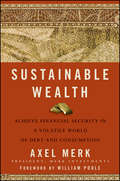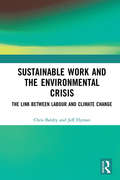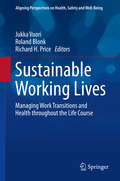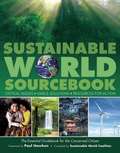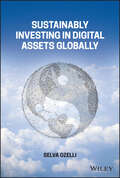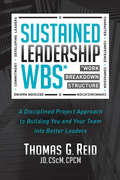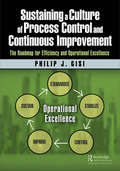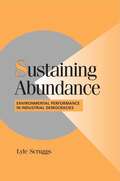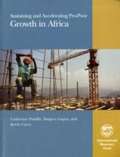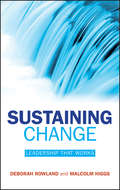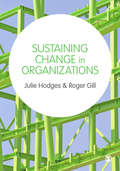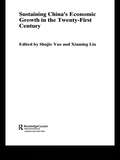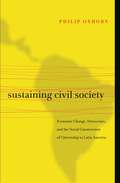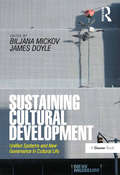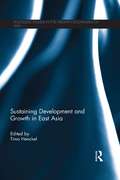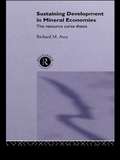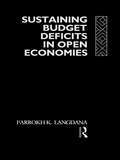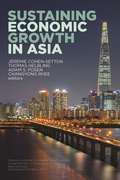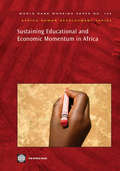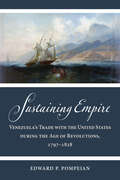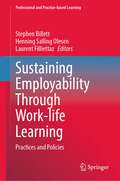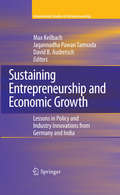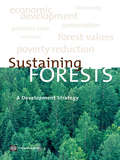- Table View
- List View
Sustainable Wealth
by William Poole Axel MerkA personal finance guide for today's turbulent worldSustainable Wealth empowers you to achieve your financial goals by unleashing the shackles of debt, no matter how uncertain the future may be. Filled with in-depth insights and practical advice, this reliable resource illustrates how you can predict economic booms and busts before they happen, adapt to changing markets and plan for lasting financial stability.Over the course of his career, Axel Merk has been at the forefront of identifying major trends, a leader in the public policy debate on how to fix the economy, and guide for investors looking to navigate the global credit crisis. With this new book, Merk puts your financial decisions in a global context and shows how factors ranging from the Federal Reserve and Congress to trends in Asia and Europe influence your financial well-being.Coaches you how to recognize major economic trends before they happenPuts forth a plan to help you cope with expenses and save for retirement, while building a legacy of wealth, not a mountain of debtReveals why "staying the course" when governments or markets change the rules may be hazardous to your wealthAs investors struggle to adapt to the new financial landscape, Sustainable Wealth provides straightforward answers to the tough financial questions we face-and the tools to achieve a financially sustainable lifestyle.
Sustainable Work and the Environmental Crisis: The Link between Labour and Climate Change
by Chris Baldry Jeff HymanCompared to 20 years ago, the jobs many people do today are increasingly characterised by low pay and insecurity, while countless others cope with workplace stress and ill-health. At the same time the consequences of our current model of economic activity are creating dangerous and critical changes in the planet’s climate. Until recently debates around these two issues have had little contact with each other. This book demonstrates that there are definite and complex connections between degraded jobs and a degraded environment, that neither the dominant economic model nor the rate at which we exploit the planet’s resources are sustainable and that the limits for both may be reached sooner rather than later. By bringing together insights from critical thinkers in a range of disciplines, the book discusses the requirements and characteristics for work to be at the same time economically, socially and environmentally sustainable and examines the potential for alternative routes to sustainable work in policies and actions that support both the natural environment and worker well-being. The book will be of interest to researchers, academics and students in the fields of HRM, labour studies, employment relations, sociology, environmental studies and sustainability. It is particularly relevant for those focusing on the link between labour and climate change. It is also highly relevant to policymakers, trade unions and NGOs looking at decent work and sustainability.
Sustainable Working Lives
by Jukka Vuori Roland Blonk Richard H. PriceThe purpose of this volume is to describe the impact of the increased demand for flexibility on employees and its impact on their individual work life trajectories and health. The volume offers concrete examples of interventions aimed to find innovative ways of sustainable work careers for today's workers. We focus on the school to work transition, job insecurity, job loss and re-employment and retirement. The interventions described offer strategies for implementing support in employment contracts, increasing preparedness of individual employees with public education programs or developing work arrangements and support systems in work organizations.
Sustainable World SourceBook
by Sustainable World CoalitionThe Sustainable World SourceBook is designed to support readers in finding pathways for effective individual and group action. It cuts through the glut of information, providing a clear, concise overview of the most important issues and aspects of sustainability that everyone needs to know.
Sustainably Investing in Digital Assets Globally
by Selva OzelliDiscover how to dip your toe into the cryptocurrency investing pool without getting burned In Sustainably Investing in Digital Assets Globally, international finance and fintech expert Selva Ozelli delivers an eye-opening and insightful discussion of cryptocurrency investment, as well as the risks and opportunities that await those who deal in this promising new technology. In the book, the author explores how cryptocurrencies have been used by illicit operators throughout the US and the world and how legitimate investors have sought to limit their exposure to illegal activity. Readers will also find comprehensive treatments of US-based and global cryptocurrency regulations, as well as: Advice for investors concerned about the environmental sustainability of blockchain technology but who still wish to invest in cryptocurrencies Information about a variety of countries and governments who have explored and implemented various cryptocurrency initiatives inside their own borders Discussions surrounding the drive by many central banks to introduce a digital currency, in addition to the surging popularity of non-fungible tokens A can&’t-miss handbook for the crypto-curious investor, Sustainably Investing in Digital Assets Globally deserves a place in the bookshelves of anyone with an interest in international finance, fintech, technology, or cryptocurrency.
Sustained Leadership WBS: A Disciplined Project Approach to Building You and Your Team into Better Leaders
by Thomas G. ReidThe Sustained Leader WBS provides a comprehensive tool for assessing and improving leadership potential. A Work Breakdown Structure decomposes every part of the work to be done in a project. Through extensive research and surveys the author has identified 229 WBS elements that apply to building yourself into a sustained leader. Each element provides a self-assessment, additional resources, and a place to record personal goals and due dates giving each reader a personal program plan to build themselves into a better leader.
Sustaining a Culture of Process Control and Continuous Improvement: The Roadmap for Efficiency and Operational Excellence
by Philip J. GisiThis comprehensive book presents a methodology for continuous process improvement in a structured, logical, and easily understandable framework based on industry accepted tools, techniques, and practices. It begins by explaining the conditions necessary for establishing a stable and capable process and the actions required to maintain process control, while setting the stage for sustainable efficiency improvements driven by waste elimination and process flow enhancement. This structured approach makes a clear connection between the need for a quality process to serve as the foundation for incremental efficiency improvements. This book moves beyond talking about the value contribution of tools and techniques for process control and continuous improvement by focusing on the daily work routines necessary to maintain and sustain these activities as part of a lean process and management mindset. Part 1 discusses process quality improvement with an understanding of variation and its impact on process performance. It continues by stressing the importance of standardizing a process to achieve process stability. Once process stability is reflected in a consistent and predictable output, attention is turned to ensuring the process is capable of consistently meeting customer requirements. This series of activities sets the foundation for process control and the sustainable pursuit of efficiency improvements. Part 2 focuses on efficiency improvement by eliminating waste while improving process flow using proven tools and methods. Although there is a clear relationship between waste elimination and process flow, these activities are discussed separately to allow those more interested in waste elimination to work independently from those looking to optimize value stream flow. Part 3 explores the principles, practices, systems, and behaviors required to maintain process control while creating a mindset of continuous incremental improvement. It considers the role organizational structure, discipline, and accountability play as essential components for long term operational success. This book will: Provide readers with a clear roadmap for establishing, achieving, and maintaining process control as the foundation upon which to pursue efficiency improvements. Establish direction and methods for continuous and sustainable process improvement Define the practices, systems, and behaviors required to realize desired results and develop a culture of process control and continuous improvement along the road to operational excellence.
Sustaining Abundance: Environmental Performance in Industrial Democracies (Cambridge Studies in Comparative Politics)
by Lyle ScruggsThe ultimate goal of environmental policy is reducing pollution. Attention to environmental problems in the social sciences has brought some bold generalizations about causes of good results, but almost no systematic cross-national studies that flesh out major theoretical arguments and test those claims with data. This study makes a seminal contribution to that effort in two ways. First, by taking environmental outcomes over the last thirty years as the central dependent variable, it provides a basis for evaluating national performance in reducing environmental problems. Second, by developing a data set including performance in a number of countries and elaborating on major explanations of environmental performance found in the literature, this study provides the most rigorous available analysis of the determinants of environmental performance. In so doing, it challenges what is probably the conventional wisdom in the social sciences.
Sustaining and Accelerating Pro-Poor Growth in Africa
by Sanjeev Gupta Kevin Joseph Carey Catherine A. PattilloGrowth in sub-Saharan Africa has recently shown signs of improvement, but is still short of levels needed to attain the Millennium Development Goals. Economists have placed increasing emphasis on understanding the policies that promote sustained jumps in medium-term growth, and the paper applies this approach to African countries. The evidence presented finds an important growth-supporting role for particular kinds of institutions and policies, but also highlights aspects of growth that are still not well understood. The paper includes policy guidance for ensuring that the poor benefit from growth.
Sustaining Change
by Rowland Deborah Higgs MalcolmThis is a book destined for leaders who wish to implement change more intelligently and effortlessly. Drawing on a combination of rigorous research and extensive organizational experience, the authors present a framework for leading change, ?Changing Leadership?, that describes the specific leader practices they have found make the biggest difference between success and failure in implementing high magnitude change. In doing all of this, the leader works to make change happen in the day to day activity and conversations of the organization.
Sustaining Change in Organizations
by Roger Gill Julie HodgesIndispensable to understanding change, this unique text provides a comprehensive examination of how change can be sustained within organizations today. Featuring critical insights into theoretical concepts and current international examples, the book provides an accessible way for students to enhance their understanding and develop the crucial skills need to be successful when managing and leading change in organisations. Key Features: Synthesizes what is known about change in organizations and then provides practical ways of sustaining it Contains an international range of case studies and interviews which link theory to practice throughout Explores key contemporary topics such as power, politics, ethics and sustainability for an enhanced understanding of current debates and issues Activities, discussion questions and further reading in each chapter test your understanding of the key concepts and reinforce your learning End of book Glossary defines key terms, for those new to studying change. Comes with access to additional resources for students and lecturers including relevant SAGE journal articles to encourage wider reading
Sustaining China's Economic Growth in the Twenty-first Century (Routledge Studies on the Chinese Economy)
by Shujie Yao Xiaming LiuEconomic growth in China has been exceptionally strong in recent decades, but the country still faces enormous economic problems, including huge poverty, uneven regional development, the problems associated with strengthening capital formation, modernising and making more productive the very large former state sector. This book presents the work of
Sustaining Civil Society: Economic Change, Democracy, and the Social Construction of Citizenship in Latin America
by Philip Oxhorn“South America is not the poorest continent in the world, but it may very well be the most unjust.” This statement by Ricardo Lagos, then president of Chile, at the Summit of the Americas in January 2004 captures nicely the dilemma that faces Latin American countries in the wake of the transition to democracy that swept across the continent in the last two decades of the twentieth century. While political rights are now available to citizens at unprecedented levels, social and economic rights lag far behind, and the fledgling democracies struggle with long legacies of poverty, inequality, and corruption. Key to understanding what is happening in Latin America today is the relationship between the state and civil society. In this ambitious book, Philip Oxhorn sets forth a theory of civil society adequate for explaining current developments in a way that such controversial neoconservative theories as Francis Fukuyama’s liberal triumphalism or Samuel Huntington’s “clash of civilizations” cannot. Inspired by the rich political sociology of an earlier era and the classic work of T. H. Marshall on citizenship, Oxhorn studies the process by which social groups are incorporated, or not, into national socioeconomic and political development through an approach that focuses on the “social construction of citizenship.”
Sustaining Civil Society: Economic Change, Democracy, and the Social Construction of Citizenship in Latin America
by Philip Oxhorn“South America is not the poorest continent in the world, but it may very well be the most unjust.” This statement by Ricardo Lagos, then president of Chile, at the Summit of the Americas in January 2004 captures nicely the dilemma that faces Latin American countries in the wake of the transition to democracy that swept across the continent in the last two decades of the twentieth century. While political rights are now available to citizens at unprecedented levels, social and economic rights lag far behind, and the fledgling democracies struggle with long legacies of poverty, inequality, and corruption. Key to understanding what is happening in Latin America today is the relationship between the state and civil society. In this ambitious book, Philip Oxhorn sets forth a theory of civil society adequate for explaining current developments in a way that such controversial neoconservative theories as Francis Fukuyama’s liberal triumphalism or Samuel Huntington’s “clash of civilizations” cannot. Inspired by the rich political sociology of an earlier era and the classic work of T. H. Marshall on citizenship, Oxhorn studies the process by which social groups are incorporated, or not, into national socioeconomic and political development through an approach that focuses on the “social construction of citizenship.”
Sustaining Cultural Development: Unified Systems and New Governance in Cultural Life
by James Doyle Biljana MickovIn Sustaining Cultural Development, Biljana Mickov and James Doyle argue that effective programmes to promote greater participation in cultural life require substantial investment in research and strategic planning. Using studies from contributors throughout Europe, they look at ways to promote cultural life as the centre of the broader sustainable development of society. These studies illustrate how combining cultural identity, cultural diversity and creativity with increased participation of citizens in cultural life improves harmonized cultural development and promotes democracy. They indicate a shift from traditional governance of the cultural sector to a new, more horizontal, approach that links cultural workers at different levels in different sectors and different locations. This book will stimulate debate amongst cultural leaders, city managers and other policy makers, as well as serving as a resource for researchers and those teaching and learning on a range of post-graduate courses and programmes.
Sustaining Development and Growth in East Asia (Routledge Studies in the Growth Economies of Asia)
by Timo HenckelFor several decades, fast-growing East Asia has been the envy of the developing world. Not only has East Asia outperformed all other regions of the world, but it also recovered surprisingly swiftly from the 1997–98 Asian financial crisis and the 2008–09 global financial crisis. Nevertheless, investment in the region remains subdued relative to pre-Asian crisis levels. Are current investment rates too low and, given greater investment, could the region grow even more rapidly? This book brings together a rich array of papers analyzing the determinants of, and impediments to, investment and growth. It discusses a range of issues bearing on investment and development. The chapters cover domestic and international economic, institutional and political factors, including the role of foreign direct investment, and the importance of public infrastructure, fiscal policy and export-oriented growth strategies. Trade and trade policy, in particular, are emphasized, with contributions ranging from an analysis of global production networks in electronics manufacturing, to the effects and implications of economic integration in the Mekong states. The chapters provide a healthy blend of theoretical and empirical analysis and offer a range of useful policy proposals. This book will be of interest to policy-makers, students and scholars of Asian economics and development economics alike.
Sustaining Development in Mineral Economies: The Resource Curse Thesis
by Richard AutyIt is widely believed that natural mineral resources are desirable. However there is growing evidence that this may not always be the case. Indeed, it seems that natural assets can distort the economy to such a degree that the benefit actually becomes a curse. In Sustaining Development in Mineral Economies, Richard Auty highlights these drawbacks and the devastating effect they can have on developing economies. With reference to six ore-exporters (viz. Peru, Bolivia, Chile, Jamaica, Zambia and Papua New Guinea) he outlines how things can go badly wrong. He particularly stresses the need to avoid `Dutch Disease' whereby competitiveness is drained out of the agriculture and manufacturing sectors so that in the long term growth falters.
Sustaining Discovery-Driven Growth
by Ian C. Macmillan Rita Gunther McgrathThe challenge of introducing discovery-driven planning to an organization isn't met necessarily just because a critical mass of people are using a few of the tools. Certain structures and practices are necessary to support the process and to sustain a discovery-driven mindset. These are outlined here, as well as the critical tasks of the CEO and senior team in making growth a real priority. This chapter is excerpted from "Discovery-Driven Growth: A Breakthrough Process to Reduce Risk and Seize Opportunity."
Sustaining Domestic Budget Deficits in Open Economies
by Farrokh LangdanaIn recent times the US economy has been characterised by burgeoning budget and current account deficits and increasing amounts of foreign capital inflows. For the UK too, the budget deficit remains a central weakness in the economy. In the light of these problems this book presents a consistent economic framework for analysing the effects and impli
Sustaining Economic Growth in Asia
by Jérémie Cohen-Setton Thomas Helbling Adam S. Posen editorsEconomic growth, inflation, and interest rates have declined in Asia, just as they have in the United States and Europe. Sustaining Economic Growth in Asia explores the relevance to several Asian economies of the diagnosis known as “secular stagnation.” Leading experts on the region discuss the fiscal and monetary policy challenges of reviving growth without generating domestic financial imbalances. The essays on innovation, demographics, spillovers, and various policy proposals are accompanied by case studies focusing on Japan, South Korea, China, India, and Indonesia.
Sustaining Educational and Economic Momentum in Africa
by The World BankForty-four African ministers of finance and of education from 28 countries met in Tunis at a July 2009 conference on "Sustaining the Education and Economic Momentum in Africa amidst the Current Global Financial Crisis." The conference attendees discussed why and how they must exercise joint political leadership during the current global economic crisis to protect the educational development achieved during the past decade. They acknowledged that educational reform is an agenda for the entire government and that strong leadership to foster cross-ministry collaboration, coordination, and mutual accountability is required to ensure that education and training investments are effective in advancing national development and economic progress.
Sustaining Empire: Venezuela's Trade with the United States during the Age of Revolutions, 1797–1828 (Studies in Early American Economy and Society from the Library Company of Philadelphia)
by Edward P. PompeianWhy did trade with the United States prolong Spanish colonial rule during the Venezuelan independence struggles?From 1790 to 1815, much of the Atlantic World was roiled by European imperial wars. While the citizens of the United States profited from the waste of blood and treasure, Spanish American colonists struggled to preserve their prosperity on an imperial periphery. Along the Caribbean coast of South America, colonial elites and officials fought to secure Venezuela from threats of foreign invasion, slave rebellion, and revolution. For these elites, trading with the United States and other neutral nations was not a way to subvert colonial rule but to safeguard the prosperity and happiness of loyal subjects of the Spanish Crown. Food insecurity, deprivation, and political uncertainty left Venezuela vulnerable to revolution, however.In Sustaining Empire, Edward P. Pompeian lets readers see liberal free trade just as colonial Venezuelans did. From the vantage point of the slave-holding elite to which revolutionary figures like Simón Bolívar belonged, neutral commerce was a valuable and effectual way to conserve the colonial status quo. But after Spain's crisis of sovereignty in 1808, it proved an impediment to Venezuelan independence. Analyzing the diplomatic and economic linkages between the new US republic and revolutionary Latin American governments, Pompeian reminds us that the United States did not, and does not, exist in a vacuum, and that the historic relationships between nations mattered then and matters now.Examining an overlooked region, Pompeian offers a novel interpretation of early United States relations with Latin America, showing how US merchants executed government contracts and established flour, tobacco, and slave trading monopolies that facilitated the maintenance of colonial rule and the Spanish Empire. Trading with the United States, Pompeian argues, kept both colony and empire under a tenuous hold despite revolutionary circumstances. A fascinating revisionist history, Sustaining Empire challenges long-standing assertions that this commerce served primarily as a vector for the one-way transmission of revolutionary, liberal ideas from the North to South Atlantic.
Sustaining Employability Through Work-life Learning: Practices and Policies (Professional and Practice-based Learning #35)
by Stephen Billett Henning Salling Olesen Laurent FilliettazThis book seeks to advance understandings of and approaches to supporting and sustaining working age adults’ learning across lengthening working lives and inevitable transitions they encounter and are required to negotiate. It is founded on the processes and findings of a three-phase practical inquiry into worklife learning and its implications for workplace and educations’ practice conducted in Australia over a three-year period commencing in 2019. Diverse perspectives and orientations were utilised in approaches to data analysis and renderings from the data, thereby opening up the analysis of these complex phenomena to different lines of interrogation, questions and analytical approaches. It elaborates more fully understandings about the processes of adults’ learning and development across their lifespan of adulthood referred to as working life, and what factors and contributions supported that learning. This book also attempts to reconcile a coherent view about development across the work lifespan, and how that can be supported by education provisions, workplaces, communities, and by the adults themselves.
Sustaining Entrepreneurship and Economic Growth
by Jagannadha Pawan Tamvada David B. Audretsch Max KeilbachAcademic research on developed countries has scientifically evaluated the role of entrepreneurship on economic growth, market expansion, commercializing innovation, and reducing unemployment. In this research, regions or industries with higher rates of entrepreneurship show higher levels of innovation and economic growth. The literature on entrepreneurship and innovation has largely ignored developing countries, despite the positive results from new venture investments in India, China, and elsewhere. This volume bridges this gap by bringing together research by scholars in Germany and India, whose analysis of entrepreneurship, innovation, and economic development in their respective countries reveals commonalities. Covering such timely issues as R&D and labor policies and including case examples from the chemical, biotech, and IT industries, the authors offer insight into the entrepreneurial process. The volume concludes with a discussion of the global implications for entrepreneurship research and policy.
Sustaining Forests: A Development Strategy
by World BankThe World Bank's Forests Strategy, adopted in October 2002, charts a path for the Bank's proactive engagement in the sector to help attain the goal of poverty reduction without jeopardizing the environmental values intrinsic to sustainability. This strategy replaces the Bank's 1991 Forestry Strategy, and was developed on the basis of the findings of an independent review of the 1991 strategy and a two-year consultative process with development partners and stakeholders around the world. The revised strategy, Sustaining Forests, is built on three guiding pillars: harnessing the potential of forests to reduce poverty, integrating forests into sustainable economic development, and protecting global forest values. Recognizing the key role forests play in contributing to the livelihoods of people living in extreme poverty, government and local ownership of forest policies and interventions are emphasized along with the development of appropriate institutions to ensure good governance and the mainstreaming of forests into national development planning. The strategy also aims to support ecologically, socially and economically sound management of production forests by ensuring good management practices through application of safeguard procedures and independent monitoring and certification. Implementation of the strategy will center on building and strengthening partnerships with the private sector, non-governmental organizations, and other donor agencies to promote better forest conservation and management at country and global levels.
